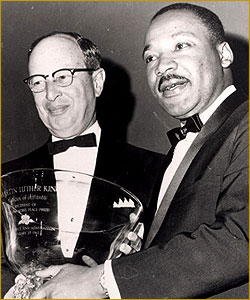- About
- Jewish Life
- Community
- Social Justice
- WELC Preschool
- Education
- Calendar
- Streaming
Rabbi Jacob Rothschild
RABBI JACOB ROTHSCHILD
Jacob Mortimer Rothschild was born in August of 1911.  Inspired by the rabbi of his childhood synagogue (Samuel Goldenson), who fought against exploitation of workers in Pittsburgh, Rothschild entered Hebrew Union College in 1927. He was ordained in 1936, but after a few stints at different synagogues, he entered the army as a chaplain in 1942.
Inspired by the rabbi of his childhood synagogue (Samuel Goldenson), who fought against exploitation of workers in Pittsburgh, Rothschild entered Hebrew Union College in 1927. He was ordained in 1936, but after a few stints at different synagogues, he entered the army as a chaplain in 1942.
It was after he completed his military service in 1946 that he came to The Temple, taking the pulpit that Rabbi Marx had held for over half a century. Having grown up in the north, and still carrying the example of his childhood rabbi, Rabbi Rothschild was immediately disturbed by the racism and segregation of the South.
In 1947, he took the opportunity of his High Holy Days sermon to denounce segregation. This was a marked shift from the tenure of Rabbi Marx. For the 51 years prior, The Temple had faced a community rife with anti-Semitism and danger, and in response they went out of their way to strike a tentative balance with their gentile neighbors. Rabbi Marx had avoided confrontational rhetoric and avoided conflicts whenever possible.
Bigotry and prejudice were still a very real threat in the 1940s, but Rabbi Rothschild felt passionately that the moral compass of Judaism demanded an active response to the injustice of the times. His activism was slow, in the beginning, but over time congregants of The Temple came to expect his sermons on racial justice.
Rabbi Rothschild also shifted some of the classical Reform practices of his predecessor. He gently reinstated some more traditional practices and encouraged members of The Temple to observe those rituals he considered critical to Jewish identity. Such was the change at The Temple as we entered the second half of the century.
One element that he continued from Marx’s tenure was outreach to Atlanta’s Christian clergy. He joined a series of civic and interfaith organizations. Rothschild also went even further, instituting a daylong Institute for the Christian Clergy, hosted at The Temple each February. A single point of controversy was Rothschild’s insistence that black ministers be invited to all such interfaith events. He often asked black leaders to lead educational events at The Temple, in spite of those who feared such actions would elicit retribution from pro-segregation whites.
That retribution finally arrived on the morning of October 12, 1958. Fifty sticks of dynamite were placed by the northern entrance to The Temple, exploding a massive hole in the building’s outer wall. Luckily, the only damage was to the building, and nobody was harmed in the blast.
The Temple bombing, however, marked a major turning point in the history of The Temple. Rabbi Rothschild’s efforts to partner with leaders of the larger gentile community, to foster a climate of moderation, paid massive dividends on that day in 1958.
Leaders from all walks of life came out in support of The Temple. In stark contrast to the popular anti-Semitism of the early 20th century, public opinion was also in support of Jewish community. The mayor of Atlanta, William B. Hartsfield famously stood in the rubble of The Temple alongside Rabbi Rothschild. The photograph hangs in The Temple to this day.
While nobody was ever convicted of the bombing, the event and the response of those in the community strengthened the supporters of non-violence and racial justice. Rabbi Rothschild’s activism actually increased after the bombing. The Temple members wholeheartedly rallied around him, taking up leadership positions in civic and political organizations that would ultimately lead to a peaceful integration of Atlanta’s schools in the 1960s.
Dr. Martin Luther King, Jr. became friends with Rabbi Rothschild in ensuing years as well. In 1964, it was Rothschild who helped organize a banquet in King’s honor after he won the Nobel Peace Prize. After King’s assassination, it was again Rabbi Rothschild who delivered the eulogy at a memorial service organized by the combined clergy of Atlanta.
Indeed, Rabbi Rothschild continued to be an outspoken critic of segregation and racism and an outspoken supporter of the non-violence espoused by Dr. King. This was true right up until December 31, 1973, when Rabbi Rothschild succumbed to a heart attack.
His legacy, a fiery support of human decency and social justice, remains the foundation of The Temple to this day.
Visit our Rothschild Social Justice Initiative to see his legacy in action.
Tue, January 14 2025
14 Tevet 5785
Update
Today's Calendar
: 7:30am |
: 5:00pm |
: 7:00pm |
: 7:00pm |
Upcoming Programs & Events
Jan 14 |
Jan 14 |
Jan 14 |
Jan 14 |
Jan 15 |
This week's Torah portion is Parashat Sh'mot
| Shabbat, Jan 18 |
Tu BiSh'vat
| Thursday, Feb 13 |
this content.








